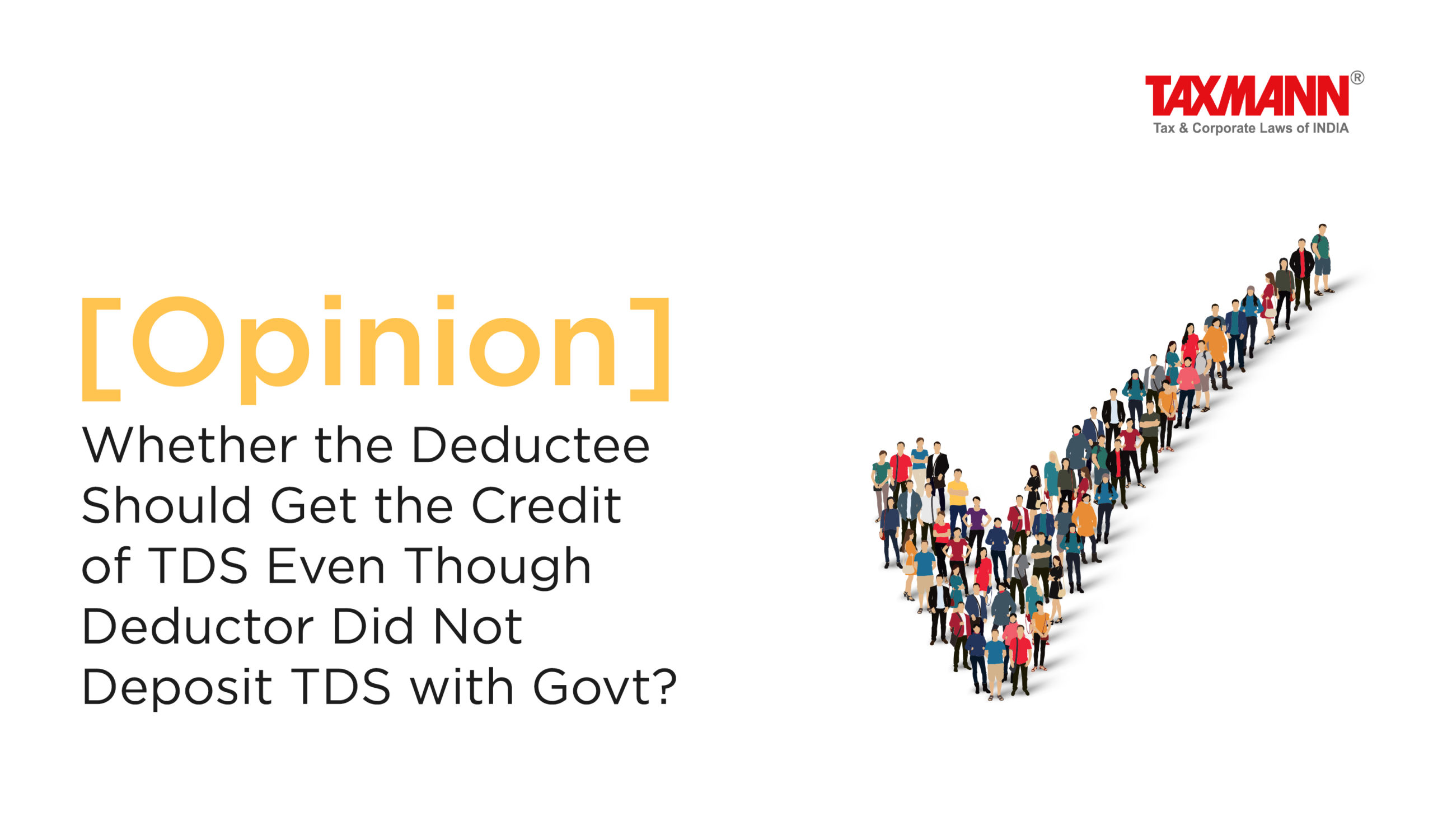[Opinion] Whether the Deductee Should Get the Credit of TDS Even Though Deductor Did Not Deposit TDS with Govt?
- News|Blog|Income Tax|
- 3 Min Read
- By Taxmann
- |
- Last Updated on 8 August, 2023

CA Mukesh Kohli – [2023] 153 taxmann.com 122 (Article)
There is a misconception among various assessees and even among various professionals that the assessee (Deductee) should not get the credit of TDS unless the deductor deposit the TDS with the Government.
Let us understand this through the provisions of income Tax Act and various case laws on this subject.
Section 205 of the Income Tax Act
Where tax is deductible at source under (the forgoing provisions of this chapter), the assessee shall not be called upon to pay the Tax himself to the extent to which tax has been deducted from that income.
On a plain reading of this provision, it is very clear that in a situation where the tax is deductible at source the Act, as and to the extent to which the tax has been deducted from the income, the assessee shall not be called upon to pay the tax himself/herself to such extent. That means what the section provides for is to put an embargo or prohibition from raising a demand on the assessee in respect of the amount, which was deductible and actually deducted to the extent it has been deducted. The section by itself does not say that the amount should also be paid to the Central Government. There is no doubt that such an obligation is cast on the person responsible namely, the person who has deducted the amount and the Act also provides for initiation of proceedings against the person on his/her failure to do so, right upto the prosecution of the person for recovery of the amount with interest. The condition of remittance is not referred to or made a requirement for the protection to the assessee under section 205 of the Act. Even if one reads the earlier provisions such as 192, 194-I, 199, 200, 201, 202 and 203 to presume that payment being on behalf of the assessee having expressly made applicable when the amount is remitted and granted to give credit to the amount of the tax payable by the assessee also, only when the amount deducted is also remitted, whereas, there is a clear departure in the case of section 205 by not mentioning the words ‘remittance of the amount’ in this section.
In fact, the bar only is not to raise demand on the assessee or to enforce recovery on the assessee after the deduction is made in respect of the amount deducted. That means, once deduction is made, the Revenue is expected to look upto the person who had deducted the tax for realizing the amount, if such person fails in remitting the amount to the Central Government.
If we look at the scheme for the provision of deduction of tax at source, it becomes obvious that such person is acting on behalf of the Revenue, i.e., as an agent of the Revenue. In fact, the person is enabled statutorily to make deduction and remit the amount to the Central Government.
When the person like a tenant acts as a representative or agent of the Revenue for such deduction and if there is any violation on his/her part, the consequence should fall only on the Revenue and that cannot be foisted on the assessee.
Click Here To Read The Full Article
Disclaimer: The content/information published on the website is only for general information of the user and shall not be construed as legal advice. While the Taxmann has exercised reasonable efforts to ensure the veracity of information/content published, Taxmann shall be under no liability in any manner whatsoever for incorrect information, if any.

Taxmann Publications has a dedicated in-house Research & Editorial Team. This team consists of a team of Chartered Accountants, Company Secretaries, and Lawyers. This team works under the guidance and supervision of editor-in-chief Mr Rakesh Bhargava.
The Research and Editorial Team is responsible for developing reliable and accurate content for the readers. The team follows the six-sigma approach to achieve the benchmark of zero error in its publications and research platforms. The team ensures that the following publication guidelines are thoroughly followed while developing the content:
- The statutory material is obtained only from the authorized and reliable sources
- All the latest developments in the judicial and legislative fields are covered
- Prepare the analytical write-ups on current, controversial, and important issues to help the readers to understand the concept and its implications
- Every content published by Taxmann is complete, accurate and lucid
- All evidence-based statements are supported with proper reference to Section, Circular No., Notification No. or citations
- The golden rules of grammar, style and consistency are thoroughly followed
- Font and size that’s easy to read and remain consistent across all imprint and digital publications are applied



 CA | CS | CMA
CA | CS | CMA
